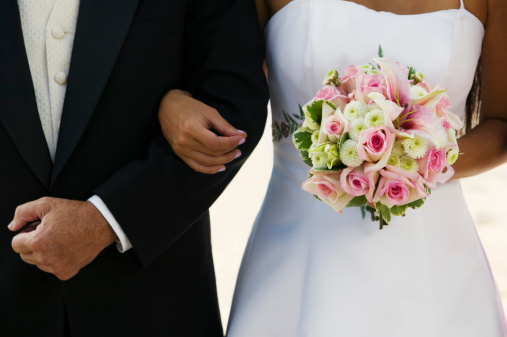Parents often express pride in their kids for getting married. But what exactly are they proud of?
At the second wedding I ever went to, my friend the bride sat, flanked by her mother, sister, and other female relatives, on what was probably the fanciest chair the synagogue owned (pretty fancy). Her guests approached her, and she gave them blessings, and they whispered things in her ears, and sometimes they cried. It was the first Jewish wedding I’d attended, and as I approached my friend, I realized I had nothing to say to her. What came out of my mouth was, “You look beautiful. I’m so proud of you.”
I thought about what I said for the entirety of the wedding, and obviously, I’m still thinking about them now. I have no idea why I said I was proud of her. I’d never in the entirety of our relationship felt the need to say that to her, but for some reason, it felt like a thing I should say to her on her wedding day.
Almost 10 years later, at another wedding, my friend’s father toasted her and her new husband and expressed his pride. But in what?
Why does it seem like marriage and pride are synonymous?
My own theory is that marriage is a measure of correctness, of normalcy, of a stability (that’s also marked by consumerism: Have an expensive wedding, buy property, have children.) If your kid gets married, they’ve done what’s expected of them, they’re performing according to societal norms.
In a 2010 piece published in Salon, Rebecca Traister wrote about Chelsea Clinton’s impending wedding, and the media frenzy around it. Traister highlighted an interview with Jenna Bush Hager, in which Bill Clinton said of his daughter’s wedding, “You know it proves you’ve done what you were supposed to do, but it doesn’t make it entirely easy.”
Asking this question on Facebook revealed people’s ideas about what marriage is. A few people spoke about the commitment and work of marriage, others about it as a marker of adulthood, and of the success of the parents. In short, your parents created you to be a person who can love another person, and theoretically, by getting married, you’re demonstrating your ability and your intention to do that.
But is pride even the right word for these feelings?
Of course it’s more complicated—it must be. Satisfaction, folks suggested to me, is a word that might be applicable, if, as a parent, your child finding a partner is part of your goals for them.
And of course, the circumstances of who’s expressing what emotion—pride, satisfaction, relief—depends on a lot: religion, region of the country, political feelings about gender, make up of the current family unit, and assumptions about what marriage means. So is pride, satisfaction, or relief about marriage, or about the relationship?
Are the good feelings about a child having found a “life partner,” or about the public affirmation of a relationship?
I’m going with “yes” as an answer to these questions, and one more: Monogamy is held up as the most moral of relationship structures—choosing a life partner and making public your commitment to one another, and to your theoretical children is an affirmation of your acceptance of that idea. (Polyamorous folks get married too, of course, and it complicates this notion.)
My own parents had an acrimonious marriage and a more acrimonious divorce. I’m being generous with the use of that adjective, they would probably describe it with words that are far worse. And at the same time, my mother did want me to get married. She associated it with safety, with being taken care, not being vulnerable, and yes, with normalcy, because loved women, normal women, got married.
It was a demonstration to the world that you were wanted.
Because I’m so deeply skeptical about marriage as an institution, as a thing, a state to aspire to, I’m not a fan of attaching the word “pride” to it. I’m wondering what’s behind the impulse to express pride to someone, especially a woman, who’s getting married, especially if you aren’t openly applying that word to, you know, other things she’s done in her life.
A lot of relationships are work, all good ones actually. There are many ways to express your love for a person. It is both possible and necessary to be dedicated to a relationship and also other things and people. If you are proud of someone for getting married, where does that pride go if the marriage dissolves? Will you also be proud of the people in the marriage for knowing what is best for themselves? Are you proud of the wholeness of a person, or for one decision they have made?
Pride is a fragile thing to hold. It’s something that we all seek, and it’s excruciating when it’s taken away. In some ways, it’s like a partnership.
Expressing your pride toward someone says a lot about what your values are, so let’s think deeply about where those values come from.
Chanel Dubofsky’s work has been published in RH Reality Check, Cosmopolitan, The Frisky, The Billfold, Lilith and The Forward, among others. She is working on her MFA in Fiction at the Vermont College of Fine Arts and lives in Brooklyn, New York.
Related Links:

